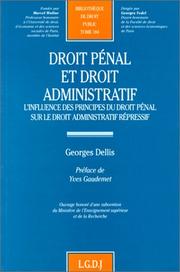| Listing 1 - 4 of 4 |
Sort by
|
Book
ISBN: 9781800375789 1800375786 1800375794 Year: 2021 Publisher: Cheltenham: Elgar,
Abstract | Keywords | Export | Availability | Bookmark
 Loading...
Loading...Choose an application
- Reference Manager
- EndNote
- RefWorks (Direct export to RefWorks)
This original and insightful book considers the ways in which public law, which emphasises legality (the Demos), and economics, a science oriented towards the markets (the Agora), intertwine. Throughout, George Dellis argues that the concepts of legality and efficiency should not be perceived separately.An Economic Analysis of Public Law shows that combining these two disciplines allows for a more realistic view of decision-making and human action, leading to the creation of a 'new' public law that improves the functioning of non-consensual institutions. The book explores the ways in which this will lead to a better coexistence of Demos and Agora, especially in modern times of globalisation and competition among regulators. Chapters cover almost all aspects of the economic analysis of public law, such as the importance of economic analysis, design and decision-making for public institutions, and a general economic theory for public law and regulation.Students, scholars and researchers in disciplines such as law and economics, European and public law in general, as well as the philosophy of law will find this book to be a valuable resource. It will also be a companion for anyone who is interested in understanding how the Law of the State and the State itself evolve in the current, globalised world.
Public law --- Law and economics. --- Droit public --- Droit --- Economic aspects. --- Aspect économique. --- Law and economics --- Economic aspects --- Droit et économie politique --- Aspect économique --- Administrative agencies --- Admiistration publique --- Decision Making --- Prise de décision --- Decision Making. --- Public law - Economic aspects --- Aspect économique.

ISBN: 2275001867 9782275001869 Year: 1997 Volume: 184 Publisher: Paris: Librairie générale de droit et de jurisprudence,
Abstract | Keywords | Export | Availability | Bookmark
 Loading...
Loading...Choose an application
- Reference Manager
- EndNote
- RefWorks (Direct export to RefWorks)
Un simple aperçu du droit positif pemet de constater que le volet répressif du droit administratif est en constant développement. La prolifération des compétences répressives qui sont attribuées aux autorités administratives est due tant aux dépénalisations qui visent à alléger le travail du juge pénal qu'à la création ex nihilo de nouvelles infractions administratives. Ce phénomène a une conséquence importante : l'action des autorités publiques ne peut plus être organisée par les règles classiques du droit administratif, qui correspondent à une conception beaucoup plus " inoffensive " du phénomène administratif. Une série de principes, qui n'étaient appliqués jusqu'à présent que dans un contexte pénal seulement, sont désormais mis en place dans des affaires administratives. De même, les organes administratifs recourent à des techniques d'instruction et de décision qui étaient initialement destinées aux seules autorités pénales. En conséquence, le droit pénal exerce sur le droit administratif une certaine influence dont l'importance mérite d'être mesurée.
Administrative law --- Criminal law. Criminal procedure --- France --- Sanctions administratives --- Dépénalisation --- Droit pénal --- Sanctions, Administrative --- Criminal law --- Dépénalisation --- Droit pénal --- Sanctions, Administrative - France. --- Administrative law - France. --- Criminal law - France. --- Droit pénal -- France --- Sanctions administratives -- France
Book

ISBN: 2275116842 9782275116846 Year: 2023 Publisher: Paris: Lextenso,
Abstract | Keywords | Export | Availability | Bookmark
 Loading...
Loading...Choose an application
- Reference Manager
- EndNote
- RefWorks (Direct export to RefWorks)
Book

ISBN: 9782849343432 Year: 2018 Publisher: [Paris] : Mare & Martin,
Abstract | Keywords | Export | Availability | Bookmark
 Loading...
Loading...Choose an application
- Reference Manager
- EndNote
- RefWorks (Direct export to RefWorks)
Droit public --- Contentieux administratif --- Tribunaux administratifs --- Pacteau, Bernard,
| Listing 1 - 4 of 4 |
Sort by
|

 Search
Search Feedback
Feedback About UniCat
About UniCat  Help
Help News
News